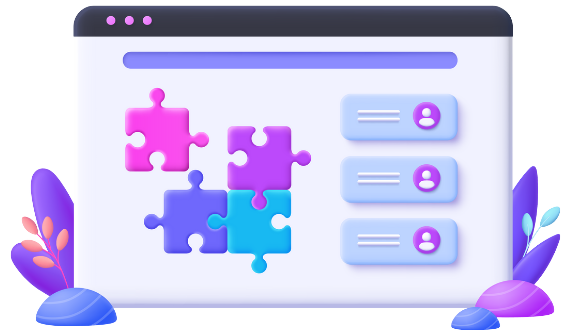"Your customers are online. Is your marketing strategy keeping up?"
In today's hyper-connected world, the internet has become the central hub for everything we do, from staying informed to shopping for groceries. It's no surprise then, that businesses of all sizes are scrambling for a slice of the digital pie. But how do you reach your target audience in this vast online landscape? Enter the realm of digital marketing.
At its core, digital marketing encompasses all marketing efforts that leverage electronic channels to connect with customers. This means ditching the traditional flyers and billboards, and embracing a more targeted and data-driven approach. But digital marketing is more than just fancy social media posts and eye-catching banner ads. Let's delve deeper and explore the technical aspects that make it such a powerful tool.
The Arsenal of a Digital Marketer

Digital marketers wield a diverse arsenal of tactics to achieve their goals. Although there is no hard and fast rule to follow, starting simple and taking things one at a time is the best and logical way forward.
Content Marketing: First start with content marketing. Create and share valuable, informative content (like blog posts, infographics, or videos) that attracts and engages your target audience. This establishes you as a thought leader and builds trust with potential customers.
Search Engine Optimization (SEO): SEO is the art and science of optimizing your website and online content to rank higher in search engine results pages (SERPs) for relevant keywords. Conduct keyword research with tools like Google Keyword Planner, Semrush, Ubersuggest etc. Some of these tools are free while others may pull out a few coins from your pocket. Not only this, but some of these tools help you to compare your articles and your competitors articles to help you realize the places you are lacking behind in. But SEO is not limited to keyword usage only, it involves a myriad of tasks of optimizing title tags, meta descriptions, URLs, backlinking etc.
Social Media Marketing: Utilize social media platforms like Facebook, Instagram, or Twitter to connect with your audience, share content, and build brand awareness. Social media allows for two-way communication, fostering a community around your brand. Utilizing tools like Meta Business Suit allows to track page and post performance indicating outreach and engagement. But what matters is drawing insights from these data to draw up fruitful conclusions on which decisions can be acted upon.
Email Marketing: Build an email list and send targeted email campaigns that promote your products, services, or special offers. Email marketing allows for personalized communication and is a great way to nurture leads and convert them into customers. Remember! The focus is on the word personalized. The recipients of the mail must feel like you are generally interested in them and it is not just another coldmail. Mailchimp, instantly.ai, Gmass are great tools that aid your emailing efforts.
Search Engine Marketing (SEM): Search Engine MArketing is a bit further into the process. SEM involves paid advertising on search engines like Google or Bing. Specific keywords are bidded on to create targeted ads that appear alongside search results. Advertisers pay a fee each time their ad is clicked. This requires meticulous keyword research, ad copywriting, and performance tracking.
Affiliate Marketing: Lastly, partner with other businesses or individuals (affiliates) to promote your products. Affiliates earn a commission for each sale generated through their marketing efforts. This requires tracking and managing affiliate links and performance but is a great way to ensure that your product is promoted in relevant places. Target affiliates who write product blogs and have a lot of followers. This also increases your backlinks required for SEO.
FLOW
One Platform, Endless Efficiency.
Create automations to increase efficiency and smoothen workflow.
Try Now!
The Power of Data: Measurement and Optimization
Unlike traditional marketing methods, digital marketing offers a significant advantage: measurability. Through analytics tools and platforms, marketers can track the performance of their campaigns in real-time. This allows for data-driven decision making. By analyzing metrics like website traffic, engagement rates, and conversion rates, marketers can identify what's working and what's not, and constantly optimize their campaigns for better results.
The Benefits of Going Digital
So, why is digital marketing so important for businesses today? Here are some compelling reasons:
Reach a Wider Audience: The internet offers a global reach, allowing you to connect with potential customers anywhere in the world.
Targeted Marketing: Digital marketing allows you to target your ideal customers with laser precision. You can tailor your campaigns based on demographics, interests, and online behavior.
Cost-Effective: Compared to traditional marketing channels, digital marketing can be significantly more cost-effective. You can start small and scale your campaigns as your budget allows.
Measurable Results: As mentioned earlier, digital marketing provides valuable data and insights into campaign performance. This allows you to optimize your efforts and maximize your return on investment (ROI).
Increased Engagement: Digital marketing fosters two-way communication with your audience. You can build relationships, answer questions, and address concerns in real-time
Embracing the Digital Future
In today's digital age, having a strong online presence is no longer a luxury, it's a necessity. By understanding the various facets of digital marketing and leveraging its power, businesses can reach new heights and achieve sustainable growth. So, are you ready to take your brand digital?


